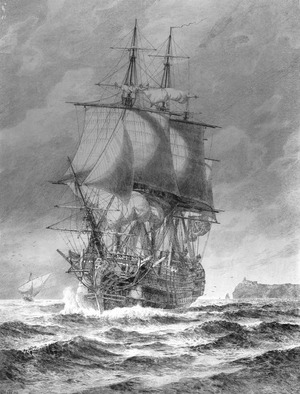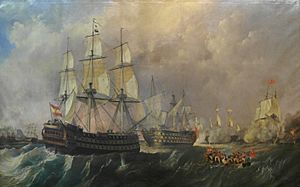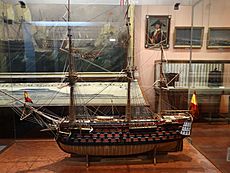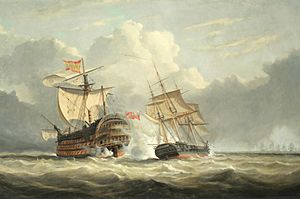Spanish ship Nuestra Señora de la Santísima Trinidad facts for kids

Santísima Trinidad
|
|
Quick facts for kids History |
|
|---|---|
| Name | Nuestra Señora de la Santísima Trinidad |
| Namesake | Holy Trinity |
| Ordered | 23 October 1767 |
| Builder | Havana, Cuba |
| Laid down | October 1767 |
| Launched | 20 March 1769 |
| Completed | August 1769 |
| Commissioned | 1 December 1769 |
| Homeport | Cádiz, Spain |
| Fate | Captured at Trafalgar, 21 October 1805; scuttled 22 October. |
| General characteristics | |
| Class and type | 140-gun first-rate |
| Displacement | 4,950 tons |
| Length | 61.3 m (201 ft) |
| Beam | 16.2 m (53 ft) |
| Draught | 8.02 m (26.3 ft) |
| Troops | ≈140 |
| Complement | 1,050 crewmen |
| Armament |
|
Nuestra Señora de la Santísima Trinidad, often called La Santísima Trinidad, was a huge Spanish warship. It was a first-rate ship of the line, meaning it was one of the biggest and most powerful ships of its time. It started with 112 guns. Later, more guns were added, bringing the total to 130 or even 136. This made it the ship with the most guns in the world during the Age of Sail.
Contents
Building the Santísima Trinidad
La Santísima Trinidad was built in Havana, Cuba. An Irish naval architect named Matthew Mullan designed it. He planned for it to have 112 guns. After he passed away, his son, Ignacio Mullán, finished building the ship. It was launched in March 1769 and completed in August of the same year.
A Giant Among Warships
When it was built, La Santísima Trinidad was much larger than other famous warships. For example, it was bigger than the British ship Victory. The Spanish even nicknamed it El Escorial de los mares, which means "The Escorial of the seas." This was because it was as grand and impressive as the famous Spanish palace, El Escorial.
Later, in 1795, the ship was made even bigger. A new deck was added, connecting the front and back parts of the ship. This new deck held more guns, bringing the total to 130 or 136. This made it a four-deck ship, which was very rare.
The "Ponderous" Ship
Adding so many guns high up on the ship made it very heavy. This made it hard to steer, especially in light winds. Because of this, it earned another nickname: El Ponderoso, meaning "The Ponderous" or "The Heavy One." Some naval officers even thought it should only be used to defend the Bay of Cádiz because it was so difficult to sail.
La Santísima Trinidad is famous for being one of the few four-deck ships of the line ever built. Other navies also tried to build similar large ships, like the U.S. Navy's Pennsylvania and the French Navy's Valmy.
Service and Battles
La Santísima Trinidad played an important role in several wars.
Fighting for Independence
In July 1779, Spain joined France in supporting the American colonists during the American War of Independence. La Santísima Trinidad became the main ship of the Spanish fleet. It took part in operations in the English Channel that summer.
On August 12, 1780, it helped capture 55 merchant ships from a large convoy. In 1782, it joined the Mediterranean Squadron and fought in the Great Siege of Gibraltar. It also took part in the Battle of Cape Spartel.
Battle of Cape St. Vincent

In 1797, La Santísima Trinidad was the flagship at the Battle of Cape St Vincent. This was a big battle against the British fleet on February 14, 1797. The ship was badly damaged and almost captured by the British.
It was first attacked by Captain, commanded by Nelson. Then, other British ships like Culloden, Blenheim, Orion, Irresistible, and Excellent joined the attack. La Santísima Trinidad lost all its masts, and many of its crew were killed or wounded.
It even lowered its flags, which meant it was surrendering. However, the British could not take control of it. Two other Spanish ships, Infante don Pelayo and Príncipe de Asturias, came to its rescue.
A few days later, the damaged Santísima Trinidad was spotted by a British frigate named HMS Terpsichore. But the Spanish ship managed to escape and returned to Cadiz for repairs.
Battle of Trafalgar
Eight years later, on October 21, 1805, La Santísima Trinidad took part in the famous Battle of Trafalgar. It was part of the combined fleet of France and Spain. Because of its huge size, it was very hard to steer in the light winds that day. This made it less effective in the battle.
Its large size also made it an easy target for the British fleet. Several British ships attacked it. It lost its mast and eventually surrendered to the British ship Neptune. The British tried to tow it away, but it was too damaged. The next day, the British had to sink it northwest of Cádiz.
Some people believe its wreck might have been found in 2009 during tests of new sonar equipment by the Spanish Navy.
Replicas and Models

You can visit a full-size copy of La Santísima Trinidad in the harbor of Alicante, Spain. It's a great way to see how huge this ship really was!
There is also a detailed 1:25 scale model of La Santísima Trinidad in Havana, Cuba. This model is four meters long. One side of the model shows the inside of the ship, so you can see how it was built. Visitors can use a computer to take a virtual tour of the ship in Spanish, English, and French. This model is displayed in the Naval Museum of La Habana, which opened in June 2008. The museum is located in Castillo de la Real Fuerza, the oldest stone fortress in the New World.
|
See also
 In Spanish: Santísima Trinidad (1769) para niños
In Spanish: Santísima Trinidad (1769) para niños


